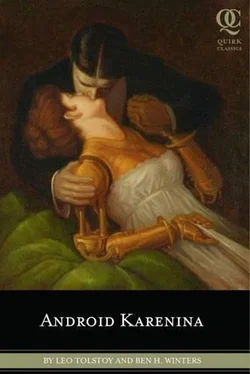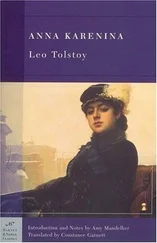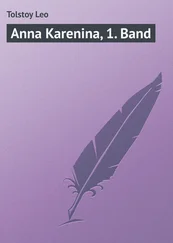The door of No. 12 was half open, and there came out into the streak of light thick fumes of cheap, poor tobacco, and the sound of a woman’s voice, unknown to Levin. But he knew at once that his brother was there; he heard his cough.
“Whom do you want?” said the voice of Nikolai Levin, angrily.
“It’s I,” answered Konstantin Levin, coming forward into the light.
“Who’s I?” Nikolai’s voice said again, still more angrily. He could be heard getting up hurriedly, stumbling against something, and Levin saw, facing him in the doorway, the big, scared eyes, and the huge, thin, stooping figure of his brother, so familiar, and yet astonishing in its weirdness and sickliness. Karnak hunched in the shadows of the corner, a battered and dented old can of an android, with black-orange streaks of rust and acid staining his copper-colored sides.
Nikolai was even thinner than three years before, when Konstantin Levin had seen him last. He was wearing a short coat, and his hands and big bones seemed huger than ever. His hair had grown thinner, the same straight mustache hid his lips, the same eyes gazed strangely and naively at his visitor.
“Ah, Kostya!” he exclaimed suddenly, recognizing his brother, and his eyes lit up with joy. Karnak raised his creaky head and groaned tiredly. But the next second Nikolai’s face took on a quite different expression: wild, suffering, and cruel.
“I wrote to you that I don’t know you and don’t want to know you. What is it you want?”
He was not at all the same as Konstantin had been fancying him. The worst and most tiresome part of his character, what made all relations with him so difficult, had been forgotten by Konstantin Levin when he thought of him, and now, when he saw his face, and especially that nervous twitching of his head, he remembered it all. Karnak let out a strange, metallic belch, and from within him some set of bedeviled gears ground together with an unbearable screech.
“I didn’t want to see you for anything,” he answered timidly. “I’ve simply come to see you.”
His brother’s timidity obviously softened Nikolai. His lips twitched. For the first time, Levin noticed a small, gray pustule pulsing just above his brother’s left eyelid.
“Come to see me. Oh, so that’s it?” Nikolai spat angrily.
“Thaaaaat’s itttt?” croaked Karnak. Socrates took a step away from the other Class III, as if afraid his rust and gear-degeneracy could be infectious.
“Well, come in. Sit down,” Nikolai continued. “Like some supper? Masha, bring supper for three, and fresh humectant for the machine-man. Yes, we have it! No, stop a minute. Do you know who this is?” he said, addressing his brother.
“This woman,” he said, pointing to her, “is the partner of my life, Marya Nikolaevna. I took her out of a bad house,” and Levin knew what was meant by this, and blushed for it. “But I love her and respect her, and anyone who wants to know me,” he added, raising his voice and knitting his brows, “I beg to love her and respect her. She’s just the same as my wife, just the same. So now you know whom you’ve to do with. And if you think you’re lowering yourself, well, here’s the floor, there’s the door.”
And again his eyes traveled inquiringly over all of them. Karnak’s big, rusty head lolled in its neck socket.
“Why I should be lowering myself, I don’t understand.”
“Then, Masha, bring supper: three portions, the humectant, the spirits and wine… No, wait a minute… No, it doesn’t matter. Go along.”
As they ate, Nikolai coughed and spat big clumps of mucous onto the floor, and Levin noticed a second gray pustule, slightly larger than the first, throbbing on his brother’s cheek. It was difficult to eat.
“Yes, of course,” said Konstantin Levin, as his brother rambled about some new idea he had, a theory about forming a new membership association for Class IIIs. He tried not to look at the patch of red that had come out on his brother’s projecting cheekbones.
“Why such an association? What use is it?”
“Why? Because robots have been made slaves, just as the peasants once were in the time of the Tsars! We feel we can treat them as objects, because we have created them, but we created them to possess consciousness, and to have free will-”
“Free will as bounded by the Iron Laws,” Levin reminded his brother.
“Yes, yes, the Iron Laws. But free will they nevertheless possess, free will of a kind. And just as God made man to pursue his own ends as he saw fit, surely we must allow magnificent automatons like these to try and get out of their slavery,” said Nikolai, exasperated by the objection. He gestured to Karnak, as if his own Class III’s magnificence were evidence enough-and at that moment one of Karnak’s arms fell off with a weak, tinny clank.
Levin sighed, looking meanwhile about the cheerless and dirty room. This sigh seemed to exasperate Nikolai still more.
It became increasingly difficult for Nikolai even to speak, as he was consumed by a series of shuddering coughs. Finally he stepped out onto the landing to expectorate mightily over the side; he found enjoyment, he announced wickedly, evacuating his sputum onto passing sledges-he considered it the one small pleasure that life had still afforded him.
Left alone with Marya Nikolaevna, Levin turned to her.
“Have you been long with my brother?” he said to her.
“Yes, more than a year.” She lowered her voice, turning away from Karnak’s sensors, although it seemed to Levin that they were pitifully befogged and incapable of registering much. “Nikolai Dmitrich’s health has become very poor. Nikolai Dmitrich drinks a great deal,” she said.
“That is… how does he drink?”
“Drinks vodka, and it’s bad for him.”
“And a great deal?” whispered Levin.
“Yes,” she said, looking timidly toward the doorway, where Nikolai Levin had reappeared. Soon he resumed his tired oration, turning to a bizarre warning that: “If we do not allow robots to control their own destiny, they will control ours.” But his speech had begun to falter, and he passed abruptly from one subject to another. Konstantin, with the help of Masha, persuaded him not to go out anywhere, and got him to bed hopelessly drunk.
Masha promised to write to Konstantin in case of need, and he departed. As he and Socrates descended the creaky stairs, Levin considered his suspicion that there was something wrong with his brother far beyond the effects of drink, and wondered what exactly it could be.
IN THE MORNING Konstantin Levin left Moscow, and toward evening he reached home. On his journey on the Grav he talked to his neighbors about politics and the new gravways, and, just as in Moscow, he was overcome by a sense of confusion of ideas, dissatisfaction with himself, shame of something or other. But when he got out at his own station, when he saw the cyclopian II/Coachman/47-T, its sturdy torso perfectly perpendicular at the controls; when, in the dim light reflected by the station fires, he saw his own sledge, his own four-treaded Puller at its head, trimmed with rings and tassels; when the Coachman mechanically relayed the village news, he began to see what had happened to him in quite a different light. He felt himself, and did not want to be anyone else. All he wanted now was to be better than before.
Then, riding on the coach from the Grav station, came the heat: the radiating warmth of the pit, his pit, which he began to feel on his skin several versts before his massive groznium mine came into view. At last, there it was, a vast and craggy crater blasted out of the countryside. The pit was half a verst long and twice again as wide, its rough rock walls sloping down into a rutted rock-lined bottom, which was dotted with a thousand small smelting fires, which rung twenty-four hours a day with the clang of pickaxes and shovels.
Читать дальше












